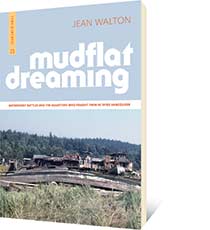Mudflat Dreaming: Waterfront Battles and the Squatters Who Fought Them in 1970s Vancouver
- Transmontanus
- 204 pages, 7×10 inches
- Price: $24 CAD · $20 USD
- ISBN: 9781554201495
- Date published: 2018-10-04
- Availability: in print & available
Purchase This Title
About Mudflat Dreaming
Mudflat Dreaming tells the story of two communities on Vancouver's waterfront fringes in the 1970s.
On the North Shore, a counter-cultural village of float houses and shacks on stilts sprouted on the estuarial Maplewood Mudflats. A few miles to the south, on the southern banks of the Fraser River above New Westminster, the long-established Bridgeview neighbourhood was mired in an endless battle with local city council for basic amenities.
As a teenager, Jean Walton lived just up the hill from Bridgeview, but it was only much later that the author learned about the struggle embroiling her near neighbours, as well as its connection to the Maplewood Mudflat squatter community — not to mention Malcolm Lowry and Habitat 76.
Walton's way into these stories is through a few documentary films made at the time about Bridgeview and Maplewood, as well as Robert Altman's breakthrough feature film, McCabe and Mrs. Miller, shot just a few miles up the mountainside from the Maplewood Mudflats.
Mudflat Dreaming traverses the intersecting domains of activist and documentary film, waterfront environmentalism, urban land use, utopian experiments, and working class struggle.
"Jean Walton's lively account of two quite different communities in the 1970s resisting a growing "culture of cement" appears at a time when Vancouver's neighbourhoods are being eaten up by that same cement. Part oral history, part film archive research, Mudflat Dreaming resuscitates the spirit of opposition to uniformity and profit-making at the expense of those who recycle, self-build, and live by water. This is necessary history, rooted in place and deeply West Coast."
— Daphne Marlatt
'Jean Walton's Mudflat Dreaming is a wonderfully evocative account of the varied ways in which an alternative Vancouver was imagined, constructed and lived by its residents in the 1970s. From waterfront squatting to protests over basic amenities, the book recovers a city that has long since disappeared but whose history remains as important as ever. A timely and urgent reminder of what it means to think about and inhabit cities differently.'
— Alexander Vasudevan, author of The Autonomous City
